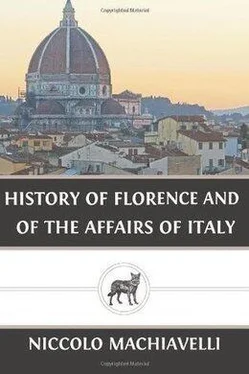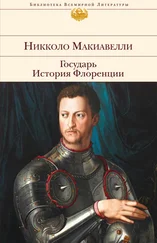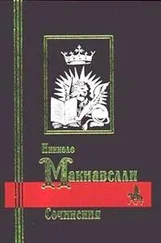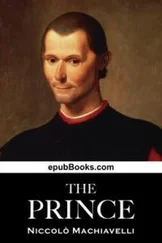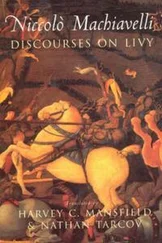The castles being restored, and this new alliance established, Lorenzo de' Medici recovered the reputation which first the war and then the peace, when the king's designs were doubtful, had deprived him of; for at this period there was no lack of those who openly slandered him with having sold his country to save himself, and said, that in war they had lost their territories, and in peace their liberty. But the fortresses being recovered, an honorable treaty ratified with the king, and the city restored to her former influence, the spirit of public discourse entirely changed in Florence, a place greatly addicted to gossip, and in which actions are judged by the success attending them, rather than by the intelligence employed in their direction; therefore, the citizens praised Lorenzo extravagantly, declaring that by his prudence he had recovered in peace, what unfavorable circumstances had taken from them in war, and that by his discretion and judgment he had done more than the enemy with all the force of their arms.
New occasions of war in Italy—Differences between the marquis of Ferrara, and the Venetians—The king of Naples and the Florentines attack the papal states—The pope's defensive arrangements—The Neapolitan army routed by the papal forces—Progress of the Venetians against the marquis of Ferrara—The pope makes peace, and enters into a league against the Venetians—Operations of the League against the Venetians—The Venetians routed at Bondeno—Their losses—Disunion among the League—Lodovico Sforza makes peace with the Venetians—Ratified by the other parties.
The invasion of the Turks had deferred the war which was about to break forth from the anger of the pope and the Venetians at the peace between the Florentines and the king. But as the beginning of that invasion was unexpected and beneficial, its conclusion was equally unlooked for and injurious; for Mahomet dying suddenly, dissensions arose among his sons, and the forces which were in Puglia being abandoned by their commander, surrendered Otranto to the king. The fears which restrained the pope and the Venetians being thus removed, everyone became apprehensive of new troubles. On the one hand, was the league of the pope and the Venetians, and with them the Genoese, Siennese, and other minor powers; on the other, the Florentines, the king, and the duke, with whom were the Bolognese and many princes. The Venetians wished to become lords of Ferrara, and thought they were justified by circumstances in making the attempt, and hoping for a favorable result. Their differences arose thus: the marquis of Ferrara affirmed he was under no obligation to take salt from the Venetians, or to admit their governor; the terms of convention between them declaring, that after seventy years, the city was to be free from both impositions. The Venetians replied, that so long as he held the Polesine, he was bound to receive their salt and their governor. The marquis refusing his consent, the Venetians considered themselves justified in taking arms, and that the present moment offered a suitable opportunity; for the pope was indignant against the Florentines and the king; and to attach the pope still further, the Count Girolamo, who was then at Venice, was received with all possible respect; first admitted to the privileges of a citizen, and then raised to the rank of a senator, the highest distinctions the Venetian senate can confer. To prepare for the war, they levied new taxes, and appointed to the command of the forces, Roberto da San Severino, who being offended with Lodovico, governor of Milan, fled to Tortona, whence, after occasioning some disturbances, he went to Genoa, and while there, was sent for by the Venetians, and placed at the head of their troops.
These circumstances becoming known to the opposite league, induced it also to provide for war. The duke of Milan appointed as his general, Federigo d'Urbino; the Florentines engaged Costanzo, lord of Pesaro; and to sound the disposition of the pope, and know whether the Venetians made war against Ferrara with his consent or not, King Ferrando sent Alfonso, duke of Calabria, with his army across the Tronto, and asked the pontiff's permission to pass into Lombardy to assist the marquis, which was refused in the most peremptory manner. The Florentines and the king, no longer doubtful about the pope's intentions, determined to harass him, and thus either compel him to take part with them, or throw such obstacles in his way, as would prevent him from helping the Venetians, who had already taken the field, attacked the marquis, overran his territory, and encamped before Figaruolo, a fortress of the greatest importance. In pursuance of the design of the Florentines and the king, the duke of Calabria, by the assistance of the Colonna family (the Orsini had joined the pope), plundered the country about Rome and committed great devastation; while the Florentines, with Niccolo Vitelli, besieged and took Citta di Castello, expelling Lorenzo Vitelli, who held it for the pope, and placing Niccolo in it as prince.
The pope now found himself in very great straits; for the city of Rome was disturbed by factions and the country covered with enemies. But acting with courage and resolution, he appointed Roberto da Rimino to take the command of his forces; and having sent for him to Rome, where his troops were assembled, told him how great would be the honor, if he could deliver the church from the king's forces, and the troubles in which it was involved; how greatly indebted, not only himself, but all his successors would be, and, that not mankind merely, but God himself would be under obligations to him. The magnificent Roberto, having considered the forces and preparations already made, advised the pope to raise as numerous a body of infantry as possible, which was done without delay. The duke of Calabria was at hand, and constantly harassed the country up to the very gates of Rome, which so roused the indignation of the citizens, that many offered their assistance to Roberto, and all were thankfully received. The duke, hearing of these preparations, withdrew a short distance from the city, that in the belief of finding him gone, the magnificent Roberto would not pursue him, and also in expectation of his brother Federigo, whom their father had sent to him with additional forces. But Roberto, finding himself nearly equal to the duke in cavalry, and superior in infantry, marched boldly out of Rome and took a position within two miles of the enemy. The duke, seeing his adversaries close upon him, found he must either fight or disgracefully retire. To avoid a retreat unbecoming a king's son, he resolved to face the enemy; and a battle ensued which continued from morning till midday. In this engagement, greater valor was exhibited on both sides than had been shown in any other during the last fifty years, upward of a thousand dead being left upon the field. The troops of the church were at length victorious, for her numerous infantry so annoyed the ducal cavalry, that they were compelled to retreat, and Alfonso himself would have fallen into the hands of the enemy, had he not been rescued by a body of Turks, who remained at Otranto, and were at that time in his service. The lord of Rimino, after this victory, returned triumphantly to Rome, but did not long enjoy the fruit of his valor; for having, during the heat of the engagement, taken a copious draught of water, he was seized with a flux, of which he very shortly afterward died. The pope caused his funeral to be conducted with great pomp, and in a few days, sent the Count Girolamo toward Citta di Castello to restore it to Lorenzo, and also endeavor to gain Rimino, which being by Roberto's death left to the care of his widow and a son who was quite a boy, his holiness thought might be easily won; and this certainly would have been the case, if the lady had not been defended by the Florentines, who opposed him so effectually, as to prevent his success against both Castello and Rimino.
Читать дальше
